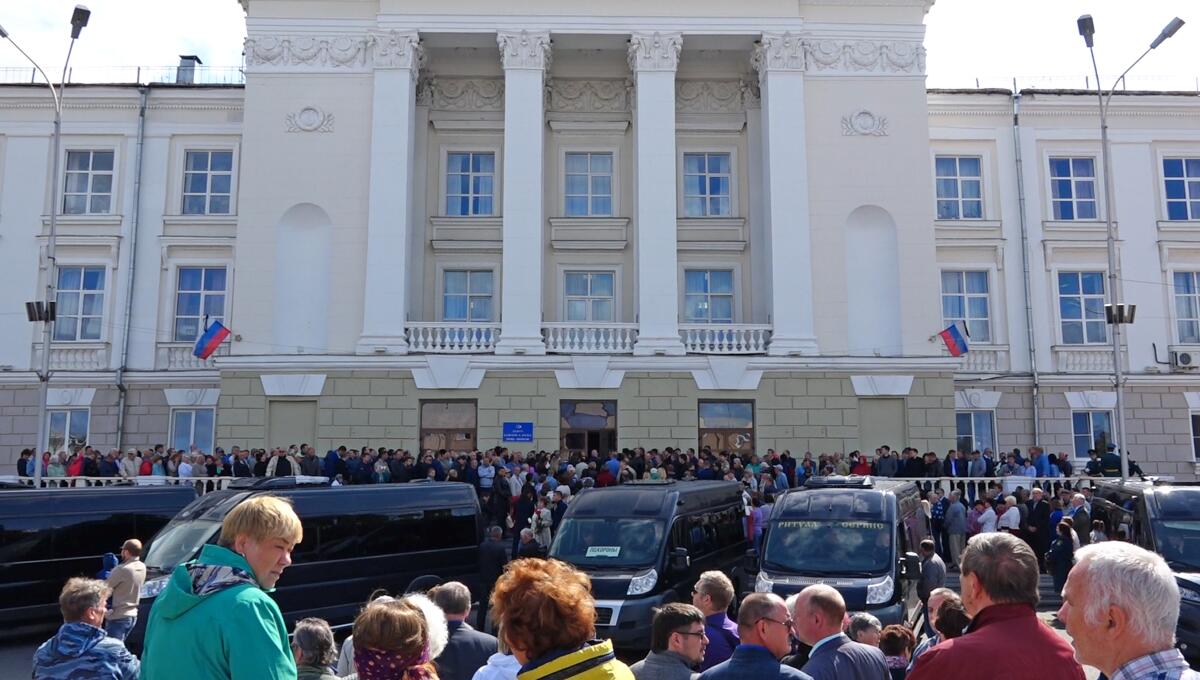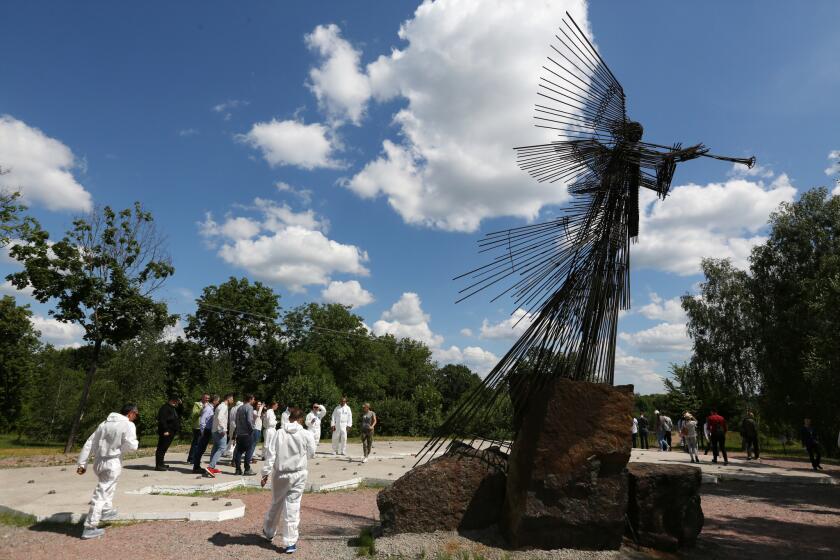After a deadly nuclear missile test in Russia’s north, the Kremlin stuck to an old Soviet habit: Secrecy

- Share via
MOSCOW — After an explosion killed five nuclear engineers last week at a northern Russian weapons research center, and reportedly resulted in a spike in radiation in the surrounding region, the Kremlin fell back on old habits: It lied, both about the number of dead and about the radiation.
Contradictory information out of Moscow and local authorities sparked public fears of a government cover-up of a more serious nuclear accident. Pharmacies in the cities of Arkhangelsk and Severodvinsk reported a run on iodine tablets as customers bought up supplies believed to reduce the thyroid gland’s intake of radioactive iodine.
By Monday, American intelligence officials seemed to confirm skeptics’ fears when their reports suggested the explosion could have involved a nuclear-propelled cruise missile.
Still, five days after the mysterious accident, the Kremlin has yet to be forthcoming. It raises the question: Has Russia learned anything about transparency since Chernobyl?
Seated in a jeep and clutching a screeching Geiger counter, Lt. Col.
“Hiding information about disasters is a long tradition of the Kremlin,” said Pavel Salin, the director of the Center for Political Studies at the Financial University Under the Russian Government, a state university. “But now it can have serious sociopolitical consequences.”
Few facts are known about what really happened in Thursday’s explosion.
The story went public early that morning, when the Russian state news agency Tass reported a spike in radiation levels following an explosion at a military training ground near Severodvinsk in the northern Arkhangelsk region.
From there, official reports slowly began trickling in, only to be denied or contradicted hours later. Local residents posted photos of radiation monitors on social media, despite official statements that there was no reason to be concerned about exposure.
The next day, the Russian Ministry of Defense admitted something went wrong, but gave few details, saying only that it was testing a rocket engine.
On Friday, Rosatom, the Russian state agency for atomic power, disclosed that there was a nuclear element involved and said five of its employees had died and several were in the hospital as a result of the accident.
The defense ministry said two servicemen had been killed, putting the death toll at seven. On Monday, thousands turned out for the funerals of the nuclear engineers killed in the mysterious explosion as public speculation grew.
Then on Tuesday, more confusion: A local news portal in Severodvinsk reported that villagers from Nyonoska, the site of the military test site, would be evacuated by train early Wednesday morning for a scheduled military exercise.
Hours after that report was posted, the governor of the region said evacuation reports were false.
Trust in the Russian government has sunk as President Vladimir Putin’s ambitions to dominate the global diplomatic stage have appeared to take precedence over Russians’ concerns about declining incomes and rising inflation. Protests across the country have sprung up demanding greater local autonomy outside of Putin’s centralized system of governance.
“Now the government is in a state of being morally outdated, and therefore people will be much more concentrated on negative aspects” when there is a lack of facts, Salin said.
As in Soviet times, Russia’s information space today is largely controlled by the government. Authorities relentlessly pressure the limited independent media outlets, often forcing their closure or financial failure. Government censors routinely block websites, while judges have jailed social media users for posting or even liking posts critical of the government.
Under these circumstances, it’s no wonder old Kremlin habits are hard to shake.
Putin, a former KGB officer, has shown his preference for Soviet-era tactics of information blackouts during his 20 years of rule.
In August 2000, just after Putin’s first election, a disastrous sinking of the nuclear-powered Kursk submarine in the Barents Sea killed 118 Russian sailors. The incident was a public relations nightmare for Putin, who refused other countries’ offers to help rescue the sinking sub while the Kremlin misled and manipulated the public.
More recently, European scientists detected an increased concentration of radioactive ruthenium-106 over Europe in September 2017. The scientists claimed that the source of radiation was in Russia’s Ural Mountains, leading to speculation that it could be the Mayak power plant. The power plant had been the site of the worst nuclear accident before Chernobyl, when a buried cache of liquid radioactive waste from Mayak exploded.
But in 2017, the Russian authorities denied Mayak was involved. In July, a group of scientists scientifically proved that Mayak was the source of emissions.
“The current situation is really similar to that in the Soviet Union, when the authorities concealed information about any disaster,” said Dmitry Zhuravlev, general director of the Moscow-based Institute of Regional Problems.
But there are fundamental differences between how the Kremlin is using information today and how the Soviets used it, Zhuravlev said.
Soviet authorities sought not to say anything at all. After Chernobyl, the authorities led people to a massive May Day demonstration in Kiev, Ukraine’s capital, less than 100 miles south of the power plant, to avoid unnecessary questions. The crowd was unknowingly exposed to dangerous levels of radiation.
“In the USSR, the authorities had only one official position: Apart from happy events in the country, nothing else happened,” Zhuravlev said.
In today’s Russia, “the Kremlin is trying to give at least some information so that an information vacuum is not created. This is to prevent panic,” he said.
In the case of Thursday’s mysterious explosion, however, this plan has only partly succeeded.
In the age of disinformation, a lack of reliable information has not calmed the public but led to the rise of myths about what has happened, Zhuravlev said.
“Such a case only increases the number of people who stop believing in official information,” he said. “In the long run, this will turn into serious problems for the Kremlin. The Russians will no longer believe any official information, even when it is true.”
Putin himself has not commented on the incident. But during a Tuesday conference call with journalists, Kremlin spokesman Dmitry Peskov said, “Accidents, unfortunately, happen. They are tragedies. But in this particular case, it is important for us to remember those heroes who lost their lives in this accident.”
More to Read
Sign up for Essential California
The most important California stories and recommendations in your inbox every morning.
You may occasionally receive promotional content from the Los Angeles Times.















